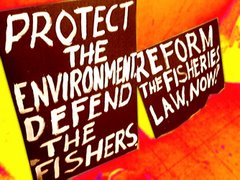An overview: Climate change and its impact under RP settings
By Reynaldo L. Lanuza / Ecosystems Research and Development Service DENR-7 (The Freeman) Updated September 03, 2009 12:00 AM
Major threats and challenges, management gaps
CEBU, Philippines - Climate change is defined by the United Nations Framework Convention on Climate Change (UNFCCC) is a change of climate attributed directly or indirectly to human activity that alters the composition of the global atmosphere. It is a climate variability observed globally over a considerable period of time. The adverse effects of climate change indicate alteration of the environment which has significant detrimental effects on the composition, flexibility or productivity of natural and managed ecosystems.
The Philippines is one of the developing countries expected to suffer most of the negative effects of climate change. Indeed, climate change is threatening the biophysical environment as manifested by increasing air temperature, rising sea levels, diminishing water tables, and unpredictable weather such as El Niño induced droughts, changing rainfall pattern, frequency and intensity of typhoons resulting to occurrence of flash floods and landslides, surges, biodiversity loss, and losses of properties and lives.
Moreover, the effects of climate change also include significant decrease in crop productivity due to incidence of new disease strains and unpredictable climate. Consequently, this will intensify socio-economic problems due low income, high price of basic commodities and may ultimately result to civil unrest.
The government is now confronted with great challenges in developing measures and strategies to slow down the effects of climate change. These challenges include the generation of information and development of information systems, intensification of information, education and communication (IEC) campaign, innovation and advancement of environment-friendly technologies, adequate financial support, formulation of effective plans and programs, good legislative agenda, and strong and persistent political will.
The management gaps are as follows: a) institution of measures to mitigate the impacts on the most vulnerable areas on the social, economic and ecological systems, and b) sustainability of food production and people’s livelihood.
Role of DENR and Institutional Framework on National Policy
DENR is the primary government agency responsible for the conservation, management, development and proper use of the country’s environment and natural resources. Its mission is to serve as driving force in the pursuit of sustainable development, enabling the stakeholders’ participation in the protection, conservation and management of environment and natural resources for the present and future generations. DENR is adopting the eco-governance concepts and strategies such as transparency, accountability and participation.
The Research, Development and Extension (RDE) framework of DENR deals on the conduct of vulnerability assessments, carrying capacity determination, rehabilitation of degraded areas, production of good quality planting materials, biomass and carbon sequestration, ecotourism, biosafety/biosecurity and biotechnology, biofuels and alternative source of energy, and effective technology transfer activities.
International experts in climate change recommended the intensification of reforestation of degraded forestlands as one of the measures to sequester carbon from the atmosphere thereby reducing the impacts of climate change.
Moreover, the government, through the DENR, should also consider a policy framework for financing climate change adaptation and mitigation mechanism that will address the following: a) capital build-up of a forestry fund for financing people-based restoration activities that are supportive to social and economic infrastructure; b) administration of forestry fund by DENR with multisectoral Board of Trustee; c) establishment of an efficient fund allocation system; and d) institution of a payback system on fund investments.
Strategies in combating climate change
With the current threats and challenges, there is a dire need to refocus and prioritize research, development and extension activities. There are two ways to address climate change, namely, adaptation and mitigation.
Consequently, the current interests will focus on these two ways. Adaptation is characterized by preparedness, increase resilience, employment of coping mechanisms and capitalizing on opportunities. On the other hand, mitigation refers to action that aims to reduce emission of greenhouse gases into the atmosphere through emission avoidance or enhancing carbon sinks and sources.
While various initiatives and interventions have been done in line with the improvement of environmental conditions, appropriate mitigation measures to reduce the impacts of climate change may require the generation, application and adoption of methodological and technological innovations. - THE FREEMAN
Thursday, September 3, 2009
Subscribe to:
Post Comments (Atom)





1 comment:
nice blog and have lots of stuff here.....
http://envrionment.blogspot.com
Post a Comment